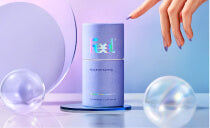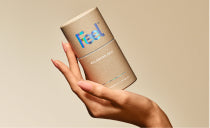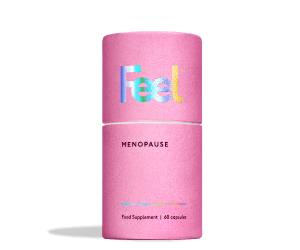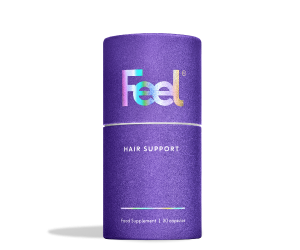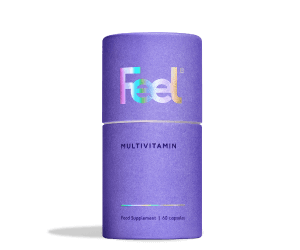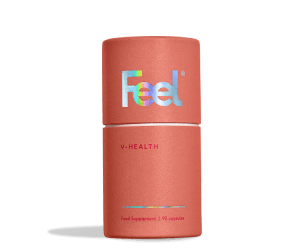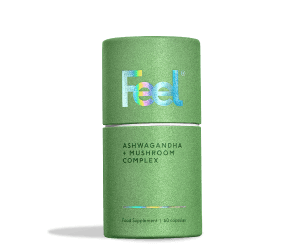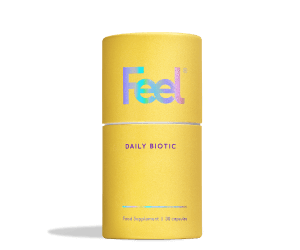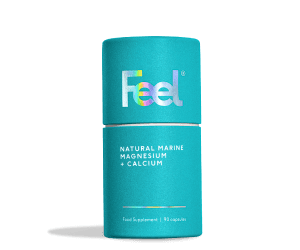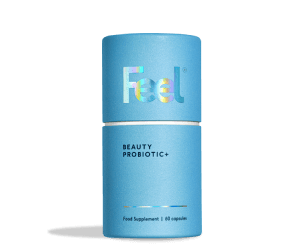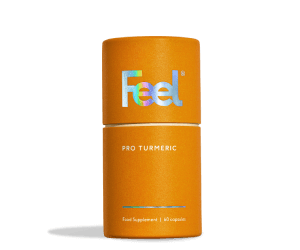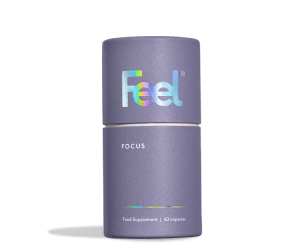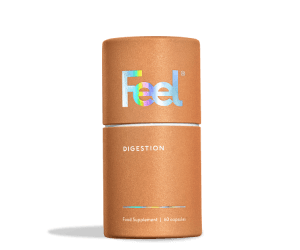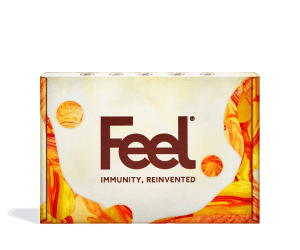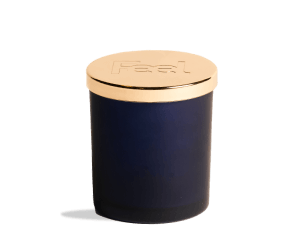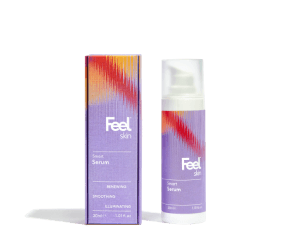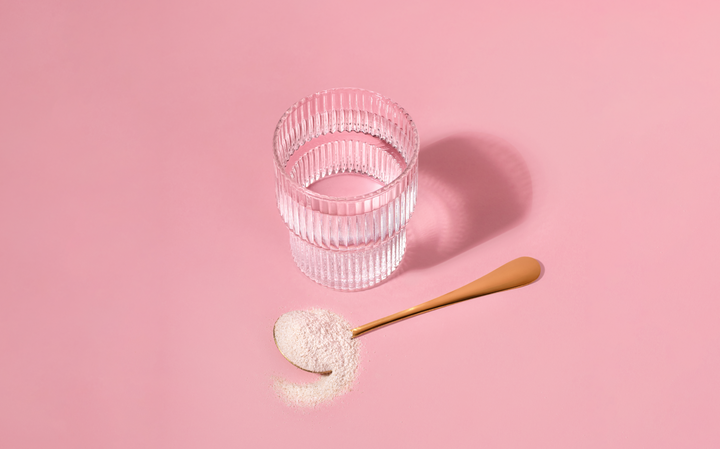1.What is Vegan Collagen?
Collagen is a protein that is naturally found in humans and animals; in fact it is the most abundant protein in the body1,2. Coming from the Greek word for “glue”, kólla 3, it is predominantly found in connective tissues such as bones, tendons and ligaments as well as in the skin 1,2,3.
Collagen does not naturally occur in plants thus supplemental collagen is usually derived from marine life or land-based animals such as bovine or porcine sources3. However, consumer demand for a more ethical and sustainable vegan alternative has led to the production of VeCollal, a fully vegan pro Collagen.
2.What forms of Vegan Collagen are there?
In the human body, there are at least 29 different types of collagen; it is “type-1” collagen that is the most abundant4 and of particular interest. It makes up 90% of the body’s collagen and is thought to play a role in the health of skin, hair, nails and joints3.

In the world of cosmetic and food supplements, collagen is derived from the by-products of various animal parts, including bones, but also hides, tendons, cartilage, horns, hoofs, the scales of fish etc. There are several methods used industrially to extract collagen which occurs mostly with enzymatic and chemical processes. The vegan friendly option made by VeCollal is a special formula of ingredients which is identical to human type-1 collagen.
3.Is Vegan collagen actually collagen?
Collagen is not a natural part of the plant kingdom. However, scientists have cleverly found ways to use a tobacco plant as an expression platform to express human type-1 collagen along with the enzymes that are crucial in its development5, 6. The scientists found that this plant-extracted collagen was structurally and functionally identical to the collagen in your body5, 6.
4. What is the difference between animal collagen and vegan collagen?
You might think that vegan collagen is less effective than animal or marine collagen, but in fact it is considered superior. Collagen extracted from animal sources, comes with risk of contamination, allergic reactions, and poor consistency or quality5,6. Harsh purification processes may result in mutations limiting functionality5. Plant-based collagen minimises these issues5,6.
Vegan collagen has another benefit over the animal-based alternative. Collagen protein is made up of amino acids - the building blocks of protein - and the exact amino acid profile is different in human collagen compared to animal or marine collagen. The great thing about vegan collagen is that it perfectly replicates the structure of our own natural collagen. Animal collagen is lacking in the essential amino acid tryptophan, therefore making it an incomplete source of protein, while vegan collagen has the full range of basic amino acids required by the human body and so is a complete protein7.
Of course, there is also the fact that the vegan collagen comes without any of the ethical or environmental downsides to animal farming.

5. What is Vegan Collagen made from?
As we have seen, vegan collagen can be synthesised by a variety of different methods using algae, bacteria and yeasts in addition to collagen expression by plants. It can also be synthesised using a complex scientific process involving the tobacco plant. The vegan friendly VeCollal product is a special formula of ingredients that mimic human collagen. VeCollal is obtained through the fermentation of glucose. This glucose comes from sugar cane, molasses or corn and is highly sustainable. As well being completely vegan, it is wheat and gluten-free. It also contains some other active ingredients including ginseng and vitamin C which have all been found to stimulate the body’s own collagen production7.
In addition, plant- derived compound Asiaticoside, which is derived from Centella asiatica or Gotu Kola, an important medicinal plant that has long been used for skin conditions and wound healing
6. What does Vegan Collagen do?
Our own collagen forms the building blocks of collagen fibrils: strong fibres used to maintain structure in the body and skin8. These make up important structural components of bones, tendons and ligaments, and play an essential role for their healthy function1.
Collagen breaks down into collagen peptides - small fragments of collagen that form a number of functions and have been shown to have an antioxidant effect 9. These little peptides also enhance moisture retention of the skin and together with their antioxidant properties they have shown to be useful in reducing skin damage and premature skin aging from sun exposure.
Vegan collagen in a supplemental form may therefore be of use for a range of health or cosmetic concerns relating to any of these body systems.
7. What is the function of Vegan Collagen supplements?
Young, healthy skin contains 75% collagen, but this naturally declines with age8. On top of this, other factors accelerate the decline of our natural collagen production, such as UV exposure, pollution, poor diet, smoking and alcohol8. While there are things we can do to support our body’s own collagen production, sometimes it is helpful to take a supplement to give the body a helping hand. This is where collagen dietary supplements can be really useful, to boost our collagen levels.
8. What is Vegan Collagen used for?
A popular use of collagen is in skincare and make-up products, which claim to reduce wrinkles, on the back of research suggesting it’s potential benefits to skin health8,9.
Collagen as a dietary supplement is becoming increasingly popular. It can be used to support healthy skin, from the outside in8 ,9, 10, and studies have found a range of other potential benefits too, including nail health10, 11, hair health10, joint health12, and soft tissue healing13.
With veganism and ethical consumers on the rise, there is an increasing demand for these topical and dietary products to be plant-based.
9. Is Vegan Collagen effective?
There is some evidence that anti-aging creams containing collagen may reduce wrinkles up to a point8,9, however its thought that this is due to the cream producing a barrier to prevent moisture evaporation, and the results may be short-lived9.
Taking collagen as a dietary supplement on the other hand has been found to be more effective for skin health. Creams work on the skin’s surface, but collagen synthesis actually takes place in the deeper dermis layer8. When you take collagen orally, it is absorbed by the gut, released into the blood stream and then accumulated in the dermis, therefore having a longer lasting effect on collagen levels8, 9.
Studies suggest collagen supplements have a number of other health benefits beyond skin, as will be discussed in more detail below. And when it comes to the vegan alternative, VeCollal have commissioned their own scientific studies. Their in vitro trial found that collagen synthesis was induced in cells given the VeCollal product, and collagen density increased in humans after 4 weeks of supplementation3.
10. How to take Vegan Collagen?
You may come across Vegan Collagen in the form of a collagen powder, capsules, gummies, as fortified foods or in topical skincare products. Collagen products may be unflavoured or flavoured, such as vanilla or berry flavoured. You may see it combined with other active ingredients like Vitamin C, Zinc, Biotin or Silica, since these are also thought to promote healthy skin and hair.
Feel’s Pro Collagen product comes in the form of a strawberry-peach flavoured collagen powder which you can mix with water or fruit juice, into your smoothie, or even stir it into your porridge. Whichever way you choose to have it, make sure you have a dose every day (that’s two teaspoons, or 10g), and don’t exceed three servings a day.
11. How long does it take for Vegan Collagen to work?
Studies have found that improvement can be seen after just 4 weeks of collagen supplementation, as long as a dose is taken daily 3,9.
On the other hand, the longer you take it, the better the results may be. A year-long study found that the benefits of collagen supplementation increased the longer the participants were taking it: after 9 months, 100% of the study’s participants had noticed an improvement in their hair and nails10.
At Feel we recommend that, if you take your Pro Collagen product daily, you should notice a difference after 28 days.
12. How long does it take for your body to absorb Vegan Collagen?
Collagen is absorbed by the gut9, 10. Assuming you have a typical diet, it will likely take 4-6 hours for your body to digest and absorb your vegan collagen10. It has been found to stay accumulated on the skin for up to 96 hours9.
13. Vegan Collagen for skin
Skincare is a popular use of collagen supplements. When we consider that 75% of young, healthy skin is made up of collagen8, 14 we can see why. As we age, collagen fibres become damaged, losing their strength and thickness8, and this leads to those signs of aging that we are all seeking to avoid. Reduced collagen production leads to thinner, dryer skin 8, wrinkles14, 15, and loss of firmness and elasticity15.
The cosmetic industry has capitalised on this with collagen-boosting creams. And some of these products have indeed been found to improve wrinkles, but don’t forget they aren’t getting to the dermis layer of the skin where collagen synthesis takes place, and results are likely to be temporary.
Dietary supplements of collagen on the other hand have had some satisfactory results in clinical trials. After 8 weeks, improvement has been found in skin dryness10, and skin elasticity and hydration9. VeCollal’s own study found a 13% reduction in wrinkles after just 4 weeks of their collagen powder supplementation, and that 80% of participants noticed a positive improvement in their skin3.
14. Vegan Collagen for hair
As part of aging our hair can become duller and drier. A study found that after just 8 weeks of collagen supplementation, participants’ dull hair had improved by 48%, and there was a 47% reduction in hair dryness10. And the results were even better amongst those who started with a greater severity of problem, with 95% noticing an improvement. After 9 months, 100% had seen the benefits, and this was significantly more than the placebo group.
15. Vegan Collagen for nails
A study was carried out on women with brittle nails11. The women, who had ragged, peeling and rough nails, were given dietary collagen peptides for 24 weeks. By the end of the trial, they had a 12% increase in nail growth, a 42% decrease in broken nails and 64% of them had a clinical improvement in their brittle nails according to a physician. As we can imagine, the ladies were pleased: 80% of them reported feeling happy with the results and that they had noticed an improvement in their nail appearance.
Another study found that nail cracking and brittleness decreased by 80% after 8 weeks supplementation of collagen and that nail softness improved10.
16.Vegan Collagen for joints
Much of the body’s natural collagen is found in connective tissues like joints, tendons and ligaments; and collagen synthesis is crucial in the repairing and prevention of injury to these areas13. Since our natural collagen production declines with age and exposure to tobacco smoke, UV radiation, oxidative stress and high-sugar, processed diets, it makes sense to supplement for additional support. Studies have been conducted into the use of Collagen supplements for patients with osteoarthritis with good results. Most of the studies found that patients showed improvement in joint function and health, as well as experiencing lower levels of pain and dependency on medication12.
Collagen supplementation may also benefit athletes. Studies found beneficial results for players of team sports and Olympic athletes suffering with joint injury12.
17. What foods contain collagen?
Dietary collagen is only available from animal products. Non-vegans could opt for bone-broth, tinned sardines of even gummies to up their intake: anything coming from bones or tendons. However, it should be remembered that the body does produce its own collagen, and there are lots we can do to support collagen formation.
Having enough protein will support your collagen levels. The amino acids hydroxyproline, proline, glycine, glutamic acid, alanine, and arginine, are the building blocks of collagen protein8. Eat a balanced diet with protein from a range of sources to help ensure you get all your essential amino acids. Beans, lentils, tofu, nuts, seeds, and quinoa are healthy plant-based protein sources, and you could use protein powders increase your intake too.

A diet rich in fresh vegetables and fruits is important for boosting collagen formation. All of these, especially when raw, contain vitamin C: an important antioxidant which plays a crucial role in collagen synthesis14. It acts as a co-factor for amino acids proline and l-lysine which promote collagen gene expression and stabilises collagen structure14. Proline and vitamin C also work together to make the amino acid hydroxyproline.
Orange coloured vegetables like carrots, squash and sweet potato are also great collagen-boosting superfoods. Not only are they rich in antioxidants but they also stimulate the synthesis of collagen fibres15.
As we have seen, reducing alcohol and exposure to toxins like tobacco smoke and pollution will also help prevent the decline of your natural collagen levels.
18.How much Vegan Collagen do I need to take to feel the benefits?
Clinical trials have used a range of dosages. VeCollal’s own in vivo experiment successfully used one 3.88g sachet daily3 - the same amount that we use in our Pro Collagen product. Don’t forget to keep it up daily for 4 weeks or more to notice the benefits.
19. What are the side effects of Vegan Collagen?
Vegan collagen can be considered safe to use. In all of the scientific studies discussed above, no significant side effects were observed in participants taking supplemental collagen, and the same goes for VeCollal’s own studies into their vegan alternative product3.
20. What are the signs of Collagen deficiency?
Collagen deficiency can give rise to a range of conditions effecting the bones, tendons, hair and skin6, including the signs of early aging. Remember having a healthy well-balanced diet with plenty of protein and fresh vegetables and fruit can support your body’s very own collagen production.
21. What is a good Vegan Collagen supplement?
There are many products being branded as vegan collagen which, to be precise, are vegan collagen boosters: they contain a mix of collagen builders rather than actual collagen. But the best vegan collagen supplements contain vegan collagen itself, of which the VeCollal product is a world first. Feel’s vegan Pro-Collagen contains VeCollal along with a range of other active ingredients to support skin health including Vitamin C, Calcium and Gotu Kola extract.
22. Where can I buy Vegan Collagen?
You can buy Feel’s Pro Collagen supplement directly from us. It is also available from the Natural Dispensary and a number of other retailers.
23. Vegan Collagen and Hyaluronic Acid
A final word should be said on Hyaluronic Acid. This is another molecule essential for skin health, in particular supporting the skin’s hydration, something that declines as we age16. Studies found that where participants were given a supplement containing both collagen along with Hyaluronic Acid, proteins and fats, beneficial effects were seen in skin health, hair health and nail health10.
References
- https://www.jbc.org/article/S0021-9258(20)87534-6/fulltext
- https://onlinelibrary.wiley.com/doi/abs/10.1111/jocd.12450
- https://www.vecollal.eu/science
- https://www.ncbi.nlm.nih.gov/pmc/articles/PMC3499978/
- https://www.liebertpub.com/doi/abs/10.1089/ten.tea.2012.0347
- https://www.tandfonline.com/doi/full/10.4161/bioe.26002
- https://www.vecollal.eu/how-it-works
- https://www.ncbi.nlm.nih.gov/pmc/articles/PMC6835901/
- https://pubmed.ncbi.nlm.nih.gov/23949208/
- https://www.beautyscoop.com/_pdf/NutritionandFoodSciencesJournalArticle.pdf
- https://pubmed.ncbi.nlm.nih.gov/28786550/
- https://pubmed.ncbi.nlm.nih.gov/18416885/
- https://journals.sagepub.com/doi/10.1177/2325967118804544
- https://pubmed.ncbi.nlm.nih.gov/28805671/
- https://www.ncbi.nlm.nih.gov/pmc/articles/PMC6791161/
- https://www.ncbi.nlm.nih.gov/pmc/articles/PMC3583886/






